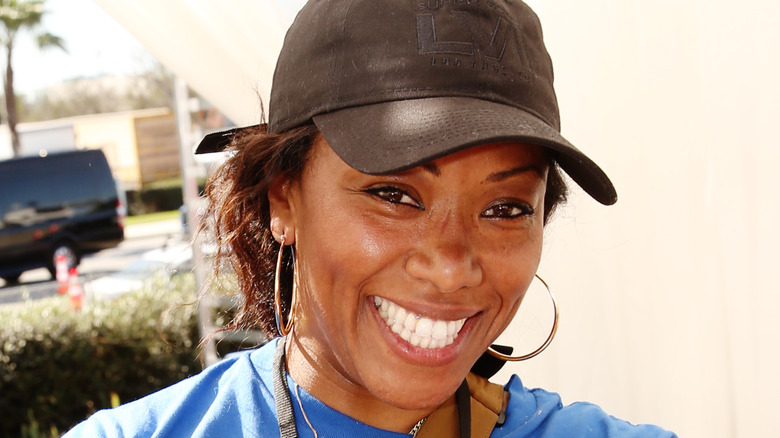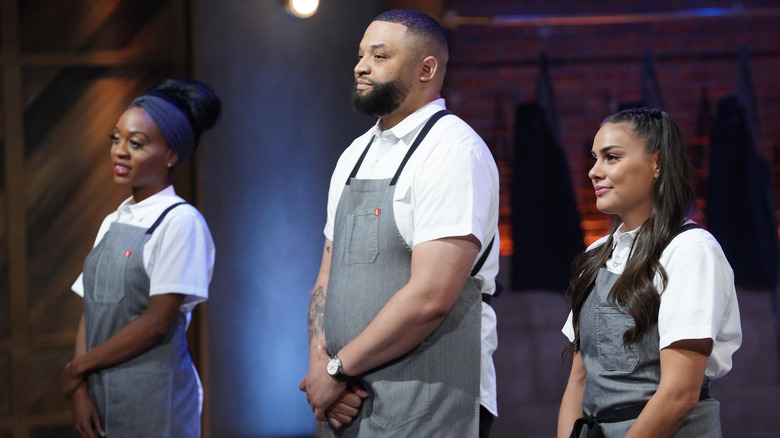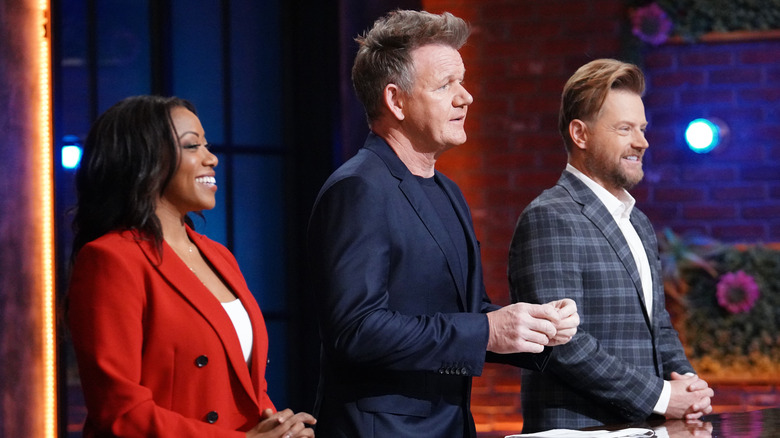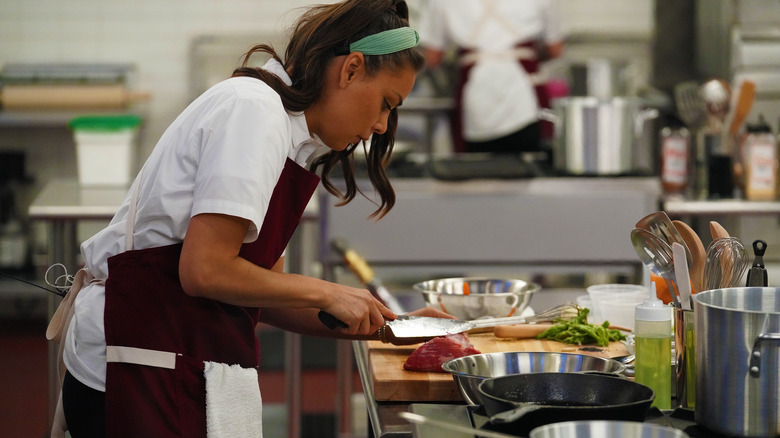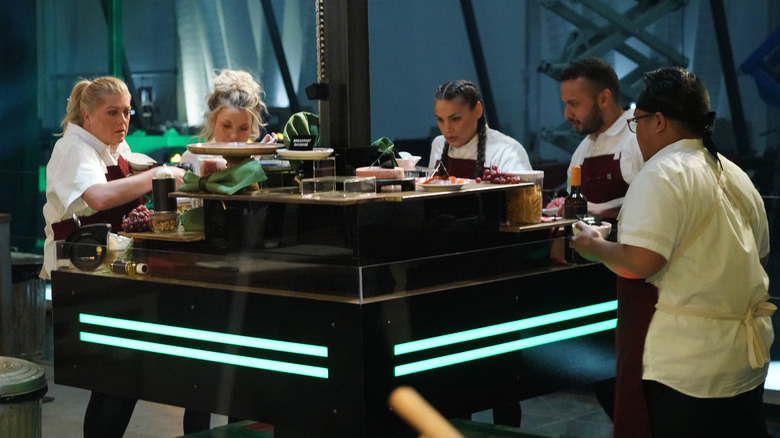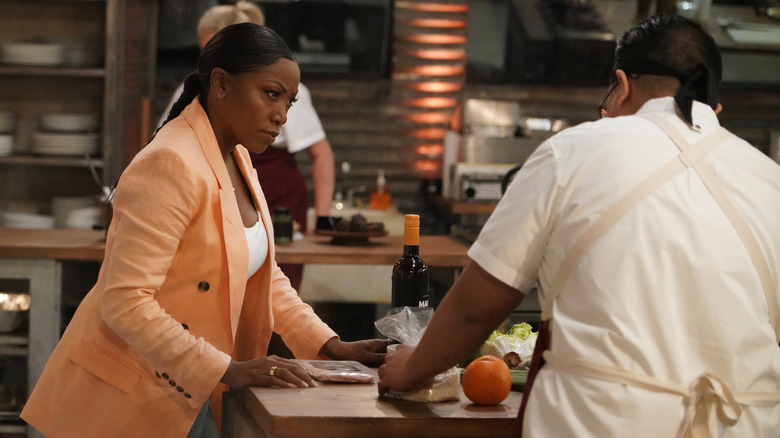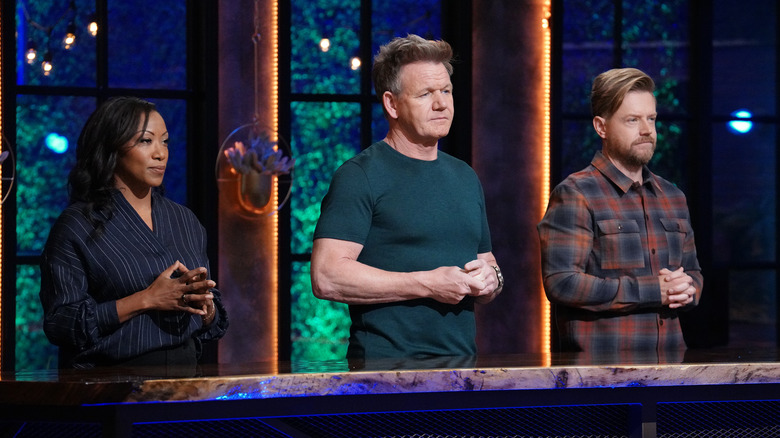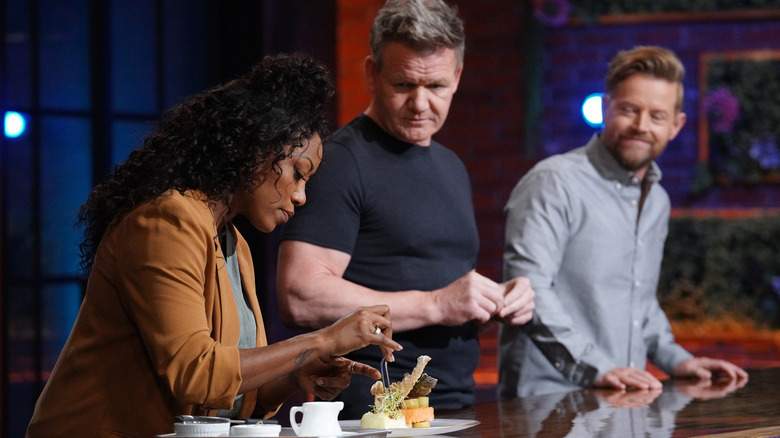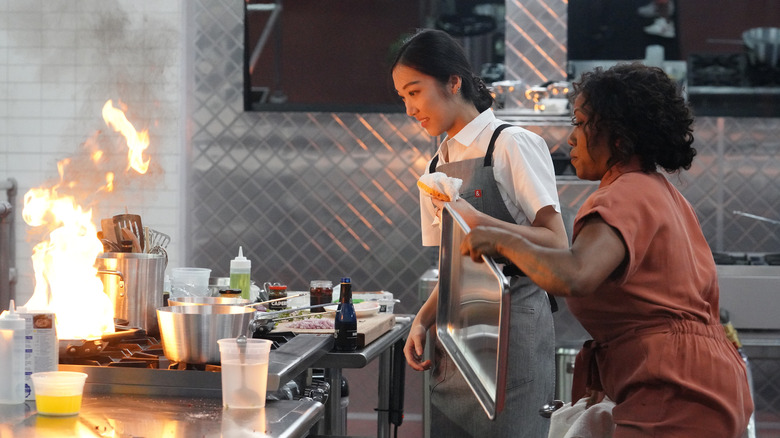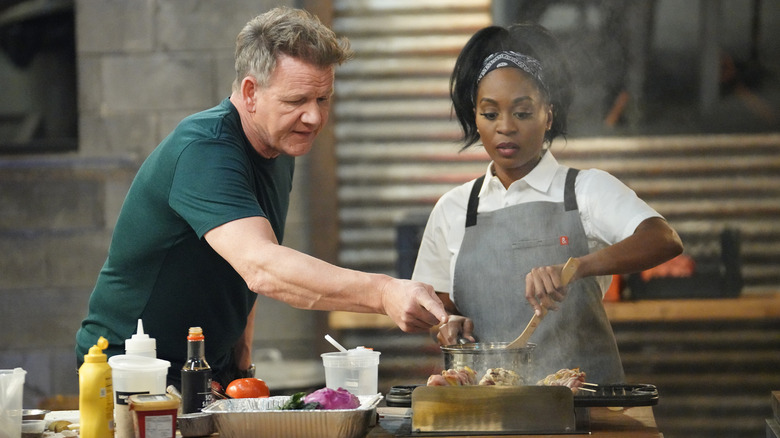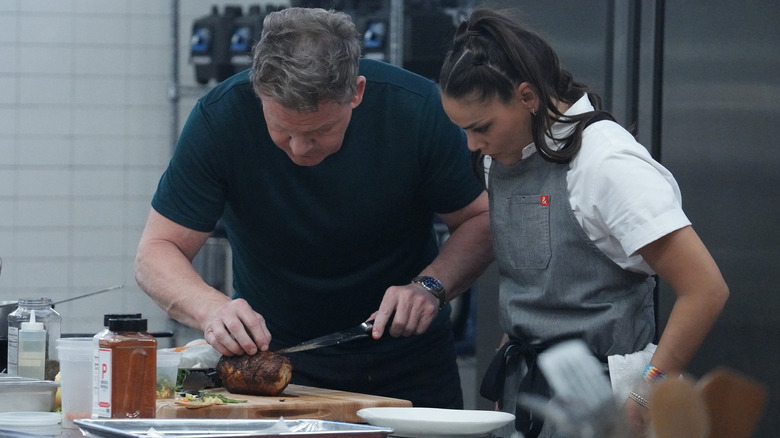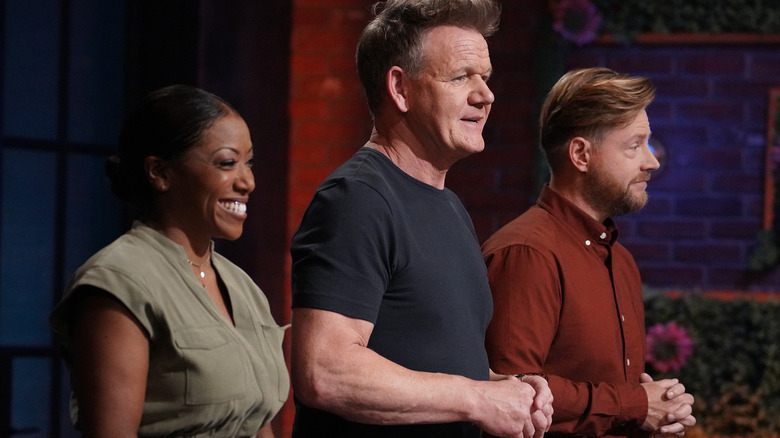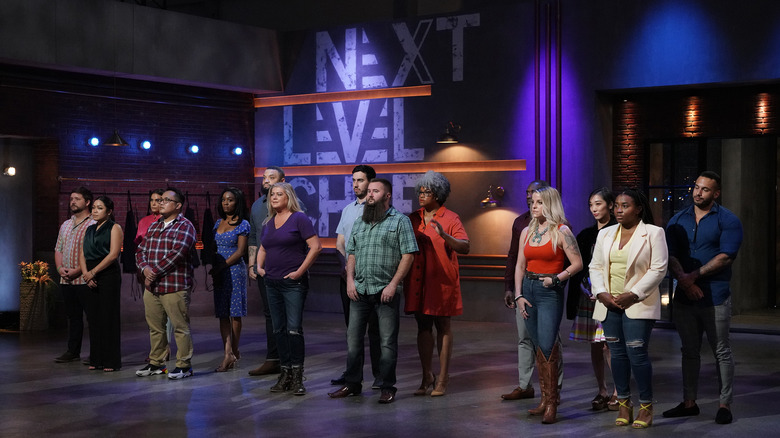Next Level Chef Winner Pyet DeSpain And Mentor Nyesha Arrington Reveal Show Secrets - Exclusive Interview
Gordon Ramsay is a fixture of food television, and a culinary icon known for his excellence, his brutal honesty, and the intensity of his kitchens. His latest project, "Next Level Chef" makes no exception. The cooking competition featured 15 chefs looking to prove their own culinary excellence, while working under the direct mentorship of Ramsay himself, alongside brilliant chefs Nyesha Arrington and Richard Blaise. Not only did the chefs have to crank out top-notch dishes under tight deadlines to face meticulous judging, but they were also forced to put their skills to the test by rotating through a series of kitchens, ranging from world-class to barely functioning. After ten weeks of mentorship, tough challenges, tons of elevator rides, and a few kitchen fires too, the first season of "Next Level Chef" has come to a next level conclusion.
And the winner is ... chef Pyet DeSpain! The Los Angeles-based social media chef was on Team Nyesha during the competition and used her Native American roots, as well as her obsession with learning new culinary knowledge, to propel her through every kitchen challenge from the basement, all the way to the top. Now, she's opening up about what it's like cooking in the Next Level kitchens, and what this win means for her. In an exclusive interview with Mashed, both DeSpain and her mentor, chef Nyesha Arrington, shared new details about the show and what it takes to be a "Next Level Chef," not to mention the life-changing experience of working with Gordon Ramsay.
Winning Next Level Chef is about more than just food for Pyet DeSpain
Congratulations Pyet, first of all! Can you tell us how it feels to be crowned the first winner of "Next Level Chef"?
Pyet DeSpain: It's actually pretty amazing. This is the first season of "Next Level Chef" and I imagine there'll be a lot more amazing people that come from the show. To be the first winner of the first season and not only that, I'm a female. I'm a woman in the culinary world. I'm also a Native American, also Mexican American, I think it's phenomenal and I'm super honored and proud to represent indigenous food. It's not only that I am native, but I'm also making native food on the show and I'm trying to bring my heritage in and it's a phenomenal experience. Yeah, I'm still pinching myself. It still hasn't totally hit me yet.
How confident were you about things going into the final round of the competition?
DeSpain: I'm a very spiritual person and [for] the entirety of filming for the show, I was really sinking deep into my spirituality and trying to connect and trying to stay calm and focused. I remember that day, I called my mom and I was like, "I think I'm going to win. I feel it in my soul. I have a feeling." I was praying the night before and I prayed that morning and I was doing my thing and meditating, trying to stay in a good frame of mind. I had this moment of a message of clarity. It was like, "You have everything that you need, you possess everything you already need to do this, you have to show up and do what you do well," and I did that to the best of my ability.
Going into that day, I was nervous and it's a huge ... Until you see the finale, you won't understand. It was a crazy day. I told myself, I have to stay calm and I was doing my best I possibly can but once it was all over, and I hadn't even known that I was the winner, not yet — we were finished cooking and we did the challenge and all of that — I wanted to cry because I was like, "Wow, I did this thing and I did it with a lot of heart and a lot of soul."
All of it's nerve-racking, but also, I had to keep that sense of calm and clarity of, "You already have what it takes to be here and you deserve to be here." As a chef, we all have our moments of imposter syndrome or not [feeling] talented enough when comparing ourselves to the next person and their journey and what they've been able to experience as chefs. I have to really stay in my lane and do what I do best.
Chef Nyesha Arrington on mentoring the winner of Next Level Chef
Nyesha, how does it feel on the first season of "Next Level Chef" to have a member from your team be crowned the winner?
Nyesha Arrington: Well, whoever would have won, I would have been proud of them. But specifically, Pyet, because she is such a soulful person. What she stands for, the competitor who showed up in the kitchen every day — every chef has good days and bad days but through the hurdles, through the gauntlet, through the three kitchens, through being a great teammate, being a great mentee — she took direction well. She also showed herself, so to say I'm proud is truly an understatement. I'm proud of her as a chef, but I'm also proud of her as a human and being able to meet her mom and see her lineage and who she is and where she comes from was truly an amazing experience.
As she mentioned, this is the first season. I'm really proud. I've always worked for male chefs coming up, so to be able to see someone striving for excellence in a space that's definitely underrepresented is very beautiful and powerful. From the show so far, there's been so many messages from around the world of people who are so inspired to see women of color out there doing the damn thing and people don't know the outcome yet. There's a lot of DMs that I get from people that are cheering for Pyet, for sure.
Chef Pyet DeSpain dishes on cooking in the Next Level kitchens
Pyet, what is it like cooking in these Next Level kitchens?
DeSpain: Oh my gosh, it's crazy. We have the three kitchens. One is just bare bones, not a whole lot going on in there — which, as a chef, you really, really have to be creative and be quick on your feet and be able to improvise and make something happen. You don't even have metal forks, you don't have metal spoons. It's crazy. We were cooking with plastic forks down there. I was trying to make a sauce, whip it up with all this elbow grease. I was like, "I've never made guac with this much elbow grease in my life." It's insane because you literally have nothing in the basement. You have to be really, really creative and so, there's moments where you're like, "How am I going to make this work?"
And then [there were] moments where I'm like, "I got this," and you're in the middle kitchen. The middle kitchen was my favorite because I feel the most at home there because I've worked at kitchens like that, your standard culinary kitchen at a restaurant.
So, the top level is not your favorite?
DeSpain: The top level was not my favorite mainly because I feel like it was so hyped up that when you get there, you're like, "Oh, I have to use all of these things." I realized nobody uses any of that stuff. When you're in that zone, you do what you're good at, and we don't get to work with those things that often. I've never used [anything to do with sous vide] in my life. I don't even know where to start with that. There was a lot of pressure being on the top floor and you have all of these things around you that you're not used to and you feel the pressure to use them., but then you're like, "I don't want to know, I don't want to do that during a competition or a challenge and then mess up." Those were not the things I was going to use. You go with your day-to-day ability to cook things.
It was very nerve-racking, and you do have to be so creative in those kitchens. It doesn't matter if you come from working in a five-star restaurant or a Michelin-Star restaurant, or if you come from a taco truck. If you don't have that creative skill set or that creative flow within you, you're not going to do well in that competition. It has to be some sense of creativity with that, with what you're given.
Next Level Chef is all about being creative on your feet
Were you guys given ahead of time to prepare for the dishes you were going to make, or were you surprised right there in the moment?
DeSpain: The mentors, Nyesha [Arrington] and Gordon Ramsay and Richard Blais, when we walk into the room and we're all lined up, we know as soon as they tell us. Then, when we leave, we have a little bit of time to think about it before they're taking us up onto the elevator. There's not a lot of time to plan your dish, but the planning didn't matter. You can have the dish in your head and you get up there and none of those ingredients are on the platform. You have an idea but you don't really have a plan. Your plan takes place when you get the ingredients in your hands at your station. Within that time frame, there's probably a couple of minutes. There's not a whole lot of time.
Chef Arrington on her experience mentoring on Next Level Chef
Nyesha, "Next Level Chef" is different in a lot of ways from other cooking competitions, but something that stands out the most is how involved you and Gordon Ramsay and Richard Blais are in the kitchen with these chefs while they're cooking dishes that you are then about to turn around and also judge. What was that experience like for you?
Arrington: Originally, I went to "MasterChef" as a guest judge and helped cook and do a demo with the finale. That's where Chef Gordon and I met and he was like, "We have to stay in touch," and I'm like, "Yeah, okay, cool." [I thought] I'm never going to see this guy again.
I was in New York and they were talking to me about the show premise [for "Next Level Chef"]. We went back and forth and the idea that it was based in mentorship really resonated with me. For me, when you come up in restaurants and you're a restaurant chef, to transfer into a culinary stage where there's lights and cameras, and you have to conceptualize your dish, and also execute it in seconds, is a skill set that takes time, you have to get the reps in and build that muscle. Having been through that, to be able to be the conduit for the chefs competing, and give knowledge and help guide, and almost light a fire under asses sometimes because it's 30 minutes. Every second matters, every bit of execution matters. Every battle that you're executing in the kitchen truly matters between winning and losing.
That was very self-fulfilling, because I could say, "Cool, I'm a mentor, I'm a judge at a cooking show," but truly, what resonates with my soul is being at an intersection in these people's lives. That is so huge for them. I'm like, "Let's go!" and I say that a lot in the show because I'm amped up and fired up for them because you truly see the spirit of these individuals. They leave it out on the field, every time we step in those kitchens. [It's a] very honorable place to be in to exercise my craft, my skill, my love for cooking, my love for people, and also mentorship and share that knowledge. Ultimately, I don't want that to stay with me and I need to feed that and plant those seeds to grow in other people and they will do the same thing. I think that's truly what makes us human.
Chef Arrington on her approach to judging chefs in the Next Level kitchens
Can you elaborate a little more on your approach to the judging process for this show? Because, like you say, the stakes are so much higher, you're invested in these team members you're mentoring. You're also trying to balance cooking on these different floors, how do you balance all that?
Arrington: This has been the largest platform of culinary stage that I have been a part of. I've done lots of TV programming and things, but never like a series where we're filming five days a week, and waking up at 6:00 in the morning, and I'd go to the gym at 4:00 in the morning to get my blood flowing. It's hard, when you're sitting in a makeup chair for an hour and a half. Like I said, I'm so invested in it. I want to hit the ground running when I get out there and present that challenge for the day. I want eyes wide open, blood flowing, like "let's go."
To be on the judges' side, I didn't want to just be with my clipboard, giving tasting notes. For me, it was important to give life notes [and] experience so that people can take this knowledge and apply it to other places in their life, business, craft, connecting with people. All those things were very important for me personally to bring to the table now that I've transitioned from the competitor side to the [judge] side.
Being wrapped in the idea of mentorship is huge for me. I wouldn't be where I am today without mentors in my life, not just one. I've had multiple mentors in different aspects of how I've grown to be the chef I am today. The way that I [cook] I feel is a bit unconventional. I came up in fine dining, I came up in very European male-dominated kitchens all of my career, bBut, most of my chefs have been female — not by choice of "Oh, I'm going to not pick males." People gravitated towards that, women specifically, to garner a skill set.
We know the kitchens aren't the easiest place to have staying power and keep that peace, as Pyet mentioned, and be spiritual and check in with yourself. We're in a reckoning within the restaurant field, but a lot of times in the past it wasn't about that. It was about, "How hard can I work? How little can I sleep? How much can I show up every day?"
A badge of honor, almost.
Arrington: Absolutely, and that's how I came up, but then in my life and my human self, I loved peace, I love calm. People exude the best result when they feel comfortable. [Being on the show was] truly an honor. The show's amazing. Everyone involved, the whole team [was] so professional, from top to bottom. From conception of the idea of this show, when we first started talking about it, to wrapping it up, when I was crying tears, it was the most amazing experience ever.
Chef Arrington reveals some of the best dishes she ate on Next Level Chef
What were some of the best or most interesting dishes that you had that stand out in your mind? I know I'm putting you on the spot because you tasted a lot of dishes.
Arrington: My brain works in taste memory, so we're all good. Specifically, like in the earlier stages, Chef Jonathan [Harrison's] swiss chard gratin was a standout dish – texturally, depth of flavor, elements of excitement, the vessels that he chose, the story behind it. He articulated his vision very well. I would have to say, Pyet made a really killer freaking dish.
Two things, her wojapi sauce, which has a cult following now, but her empanadas, [it was] nail biting watching her execute with such calmness and precision and love simultaneously while making one of the most delicious bites of food that I have had, ever. I can truly still taste the spice notes and the flaky dough. That was one of my favorite dishes. Those are two standouts.
Mariah's dish with the kebab and the thinly sliced pork with a stone fruit, that was a next level dish — the flavor, the char, the cook of the pork, the inventiveness, the freshness, impeccable. Those are probably my top three dishes from the show.
More details from the infamous Next Level kitchen fire
There's a lot going on in these kitchens. Were there kitchen mishaps that maybe aren't going to make it on camera that we're not going to get to see? Did things go flying? I want to hear some details.
Arrington: We've seen Chef Tricia be very excited about fire. There always seems to be some element of fire going on around her. [In one episode], there's a whole fire situation and I basically have to save everyone by getting rid of this pan and tossing it over the front balcony of the kitchen. It was a scary moment.
This fire's out of control because I guess she'd essentially turned all the pans on at her station without a real actual vision for what was going to go in all of those pans. By the time the pans were going to be in use, they were ripping hot and they basically engulfed in flames. It was a little bit scary. I've seen some stuff in kitchens, but there was a half a second where I was like, "Oh my gosh, is the Ansul system going to burn this set down right now?" I put salt on it, try to exhaust the fire, [but] it's still flaming up. I ended up tossing the pan to get it out of the kitchen.
Chef Pyet, do you have any crazy memories that top that?
DeSpain: I think there's nothing that tops that, to be completely honest. That was the craziest thing that happened. I'm working on the bottom floor this episode, so I'm in the basement and there's this pan coming from the freaking sky and it's on fire, it's smoking. I was like, "Oh my god, did that really just happen? What's happening up there?"
And you just keep cooking?
DeSpain: Yeah, you have to. I was like, "I'm not letting any distractions mess up my chance of winning the show. I got to keep going. S*** is being real up there.
There's things that happen that don't make it. The amount of cuts we get while we're doing stuff — there is at least once that I've been cut and I'm like, "Medic!" and I'm trying to sauté some stuff at the same time and I'm trying not to drip blood everywhere. That happens a few times for people that they don't show on the air because if they showed every cut that happened, people would be like, "These people don't know how to f***ing cook," but [in this situation], you're shaking and your nerves are everywhere and some of those knives are really, really sharp. There's a ton of finger cuts going on, so if you ever watch the show ... where someone touches their face and they have band aids on their fingers, we were going through some war in the kitchen.
Chef Arrington says Gordan Ramsay's excellence is unmatched
Chef Arrington, what was your experience like working alongside chef Gordon Ramsay?
Arrington: I set out on my culinary journey when I was 17. I was relentless, still am, in my practice of attaining excellence and pursuing my dreams of being a culinarian. I remember specifically when I was working in a two-star Michelin restaurant, and it was challenging. There were times when I literally would say to myself, "I'm checking my spirit at the door to come in and execute, fully execute because that's what those kitchens demand of you. I'm not afraid of hard work, I'm not afraid of putting my head down and working towards my dreams and not looking up until I attain them ... but I need a clear path. What is my North Star?"
I did some research and I was like, "Who's doing big things?" This was probably 2009 or 2008, maybe. Gordon had the most Michelin stars, was doing tons of TV, making amazing products. For me, and it's no disdain towards any other programs or networks, but I never wanted to be put in a box. I'm truly a right-brained creative when it comes to my craft. When I saw what Gordon was doing, I thought, "Wow, that's what I want to do," something huge, big, meaningful, impactful, but rooted in being a good culinarian.
I met him one time at an event that I was cooking at and he was so lovely and kind. Then, I was working in another kitchen, he came in the kitchen and that was super cool. He was looking at my mise en place and I was like, "Oh my god, I just met Gordon Ramsay, this is crazy." I would have never thought back then I'd be working next to this man because he's truly everything that I thought he would be. Intense, to say the least, but truly rooted in passion. I know Gordon sometimes gets a bad rap in television because he's a fiery person, but it's truly rooted in the quest for excellence and it's hard when the time is ticking, you're working with a product, you're working with individuals. You don't always have time to say, "Can you please do this again, you burned this again." No, let's get s*** done and put our feelings aside for a second.
I say all of that to preface that it was amazing. It was truly an impeccable experience. Working next to him every day, watching his brain work, being on a set ultimately led by a chef was amazing because my culinary world and my TV world [were] coming together. I've been on many sets, and to be on a set led by a chef is super cool. I cannot say more kind, glowing things about him. He's a gentleman. His brain is so high functioning that it feeds you. It's really cool to see that level of excellence be executed unwaveringly.
What it's like to learn from the best (aka Gordon Ramsay)
Chef Pyet, did you get the chance to interact with Gordon Ramsay much while filming?
DeSpain: I didn't get much interaction with him until closer to the end when we worked solo and we didn't have teams because then he was going in-between floors. I've had some phenomenal experiences with him. You try not to get starstruck because you're like, wow, this is the G.O.A.T., this is Gordon Ramsay. He's trying to teach you and I'm trying to follow along unwaveringly, so focused. He knows how to do everything all the time, and I'm like, "How do you even have a memory bank that big?"
He's the G.O.A.T. for a reason and he's so immensely talented that he literally pulls knowledge out of everywhere. I'm trying to pay attention, and this is a very chaotic environment, so I'm trying to be a sponge. I very much [try to be] a sponge, especially this early in my career. I've been a private chef for six years, and I've [worked solo] for such a long time. It wasn't until the most recent years, I told myself, "I need to get into a kitchen with other people so I can learn." You're only as good as your knowledge, and I don't have a whole lot of knowledge. I had to start trying to be a sponge and learn from people around me. Being in that kitchen with Gordon Ramsay and him teaching me how to do something, I was like, "Oh my gosh, this is insane." He's everything that you think he is and more.
Chef Pyet DeSpain says she couldn't have won without Chef Arrington's mentorship
It seems like Gordon Ramsay has the innate ability to bring out the best in the people that are trying to work with him.
DeSpain: Yeah, but [among] the three chefs and the mentors we had, all of them are phenomenal, all of them are remarkable. I had more experience with Chef Richard Blais than I did Gordon Ramsay, and I was on Nyesha's team so I had a lot of interaction with her.
I'm so immensely grateful that I had Chef Nyesha as my mentor. [Out of] the three people, I felt like I gravitated more towards Nyesha, not because she was my chef, but because of her teaching style, and her mentor style. If I were on Ramsay's team, maybe I wouldn't have done as well, because I'm very rebellious. I have a problem with male figures yelling at me, and I'm trying to look at it as a sense of like, "Okay, he's there to teach you, he's there to mentor you."
I was trying to mentally prepare myself for that, but I didn't necessarily want to be on his team. If he picked me, [I] can't say no. I was so glad that I had Nyesha as my mentor. I don't know if I would have done as well being on one of the other teams., but [I'm] not taking away from Gordon Ramsay [or] his personality at all, he's phenomenal.
Some advice for future Next Level Chefs
I'm not alone in hoping that we see future seasons of "Next Level Chef." After going through this experience, what advice do you have for the next round of contestants that come through?
Arrington: Pyet really said it best. You have to garner a skill set to be able to think under pressure. That's the main skill. You don't always have to be the best cook in the world. I can make the best dish ever if I have three hours, but can you make it under pressure when you don't know what the ingredients are? I think that's truly the skill set that people have to get the exercise in, is working under pressure, very important.
DeSpain: Educating yourself on different flavor profiles, different ingredients, the most unconventional ingredients that you can think of because you're not going to be handed the most gourmet things. That's not what the competition is. The competition is, what can you make happen out of nothing? Anyone that's willing to take on the challenge, make sure that you are well versed in all types of different ingredients and flavors. For instance, if I'm used to cooking one type of food and none of those ingredients are on the platform, what am I going to do? That's what I would say, get familiar with different flavor profiles, different spices, and things like that. That's the one thing that, [if] I had a little bit more of education in some of those areas and knowledge, it would have been great. \
But I won the show, so...
Arrington: That was pretty great.
The first season of "Next Level Chef" is now available to stream on FOX NOW and Hulu.
